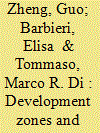|
|
|
Sort Order |
|
|
|
Items / Page
|
|
|
|
|
|
|
| Srl | Item |
| 1 |
ID:
147436


|
|
|
|
|
| Summary/Abstract |
The practice of development zones has expanded worldwide, yet scholarship persistently disagrees on the role that development zones play in local economic development. With its focus on China, this study contributes to the discussion by exploring the effects of development zones on the economic development of host regions, using both macro-level (all national-level development zones) and meso-level (county- and district-level development zones in Guangdong Province) analyses. Our data analyses of the macro-level reveal that development zones, even though positive in developed regions, do not contribute to economic growth in proportion to their share of land in host cities on the whole. The result is confirmed by the meso-level data analysis that indicates that county- and district-level development zones in Guangdong Province, a developed region in southern China, imposed positive effects on local economies. Therefore we suggest that the Chinese central government should not expand development zones without limits, but carefully consider their location and size in relation to the host regions before approving them.
|
|
|
|
|
|
|
|
|
|
|
|
|
|
|
|
| 2 |
ID:
128157


|
|
|
|
|
| Publication |
2013.
|
| Summary/Abstract |
The paper offers an updated picture of the policies implemented by the government of the Guangdong Province (China) to foster the industrial development and the technological upgrading of its territories. Among these policies is the promotion and the institutional acknowledgement of a growing number of industrial clusters, defined as "Specialised Towns", characterized by a high spatial concentration of firms producing one specific item (or a limited range of similar products). In the view of the provincial and local governments these types of industrial development programs are used to increase firm agglomerations, spatial concentration and visibility, which in turn leads to increased specialisation, industrial output, innovation and economic growth. However, little specific empirical evidence has been collected to support this view and the debate, at the national and international level, on the effectiveness of such interventions seems to be still largely ideological. The paper offers a contribution in this sense by offering a detailed description of the policy tools, by suggesting synthetic indexes to quantify policy efforts and industrial performances in Guangdong territories and by providing a first statistical analysis of these indexes.
|
|
|
|
|
|
|
|
|
|
|
|
|
|
|
|
| 3 |
ID:
182777


|
|
|
|
|
| Summary/Abstract |
Mergers and acquisitions (M&As hereafter) have been widely examined in the economic and business literature under many perspectives. However, the industry-level view, specifically the relation between industrial policies and M&A waves at the sectoral level, has remained rather unexplored. This article contributes to fill this gap by empirically investigating the relation between selective industrial policies and M&A waves at the industry level in China. Referring to the four Five Year Plans covering the period 1996–2015, we explore whether being identified as an emerging sector in these plans generates positive or negative changes in the number of M&As. We reiterate the analysis according to the different types of M&As (vertical, horizontal or conglomerate) and the different natures of the acquirer (SOEs or private). Our results suggest that policies can differentially affect M&A waves according to the type of M&A. Moreover, while private firms are more responsive to both horizontal and vertical integration in emerging sectors, SOEs are more prone to engage in vertical M&As. We discuss the possible rationales behind the different behaviors. We also draw general policy implications on strategic industrial policy and market restructuring.
|
|
|
|
|
|
|
|
|
|
|
|
|
|
|
|
|
|
|
|
|